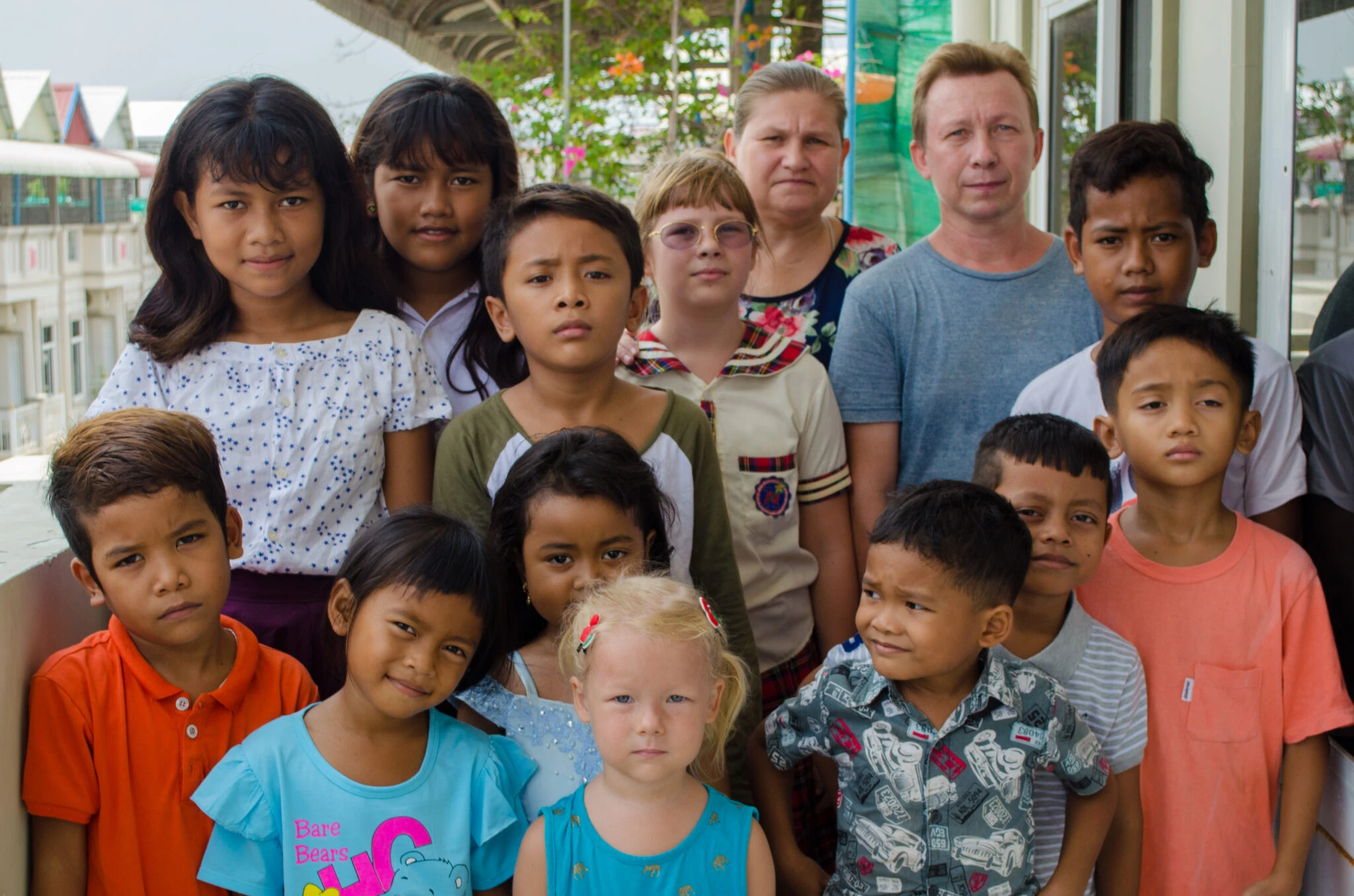Yevhen Evva, a Missionary from Cambodia, “Each Christian Needs to Find Himself in God.”
1 August 2022
This interview is about Cambodia, a country of smiles and orphans, local people and their features; about reasons for which it is easy and at the same time difficult to preach to the Buddhists; about what it is for a Ukrainian to live in an Asian country and how Cambodia differs from Egypt in terms of preaching the Gospel; about ways to reach out the Khmers with the Gospel and important lessons for each Christian in his or her ministry to the Lord. This is what Yevhen Yevva, a missionary with 18-year experience in Ukraine and several other countries of the world, has shared with us.
Yevhen Yevva, a missionary with 18 years of service in Ukraine and several countries of the world, told about all this and about his formation as a minister in an interview.
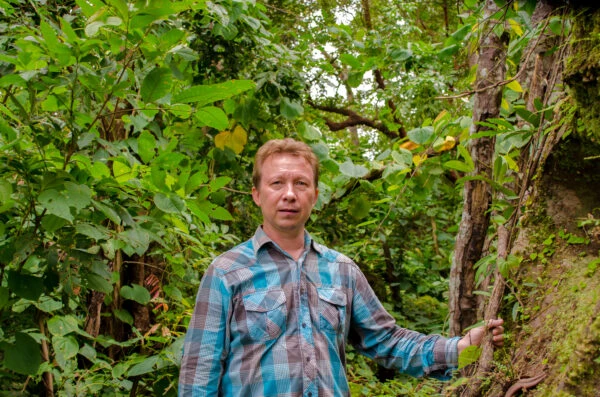
– Yevhen, I know that you are still surprised to have become a missionary in Cambodia! How did God lead you in this decision to become a missionary and keep your commitment for around 18 years? Could you share your story?
When the soviet union collapsed, I was 16-17. At that time, young people like me were interested in Viktor Tsoy, vine and girls. Once, a girl joined our get-together and told us about God. We, to put it mildly, mocked her. However, after her visit, we started discussing the probability of God’s existence. Another girl hanging out with us said that some believers came over to her mother. So, some of us went to talk to them. As it turned out, those believers were Jehovah’s witnesses. I did not have any idea of who the Baptists, Pentecostals, Charismatic or Lutheran Christians were… For me those people were dark woods.
At the same time, my older brother started attending a Baptist church. As I was interested, I repeatedly asked him to take me with him. Every time I asked him my brother was reluctant to do that as I could make him ashamed because, according to him, I liked arguing “too much.”
So, I joined the Jehovah’s witnesses, though my brother was a Baptist. I argued every evening! The debates were so heated that on several occasions an ambulance came to help me (I have a heart disease). Eventually, my mother forbade us to argue about spiritual issues. We, of course, stopped doing that in her presence.
In some time, I was admitted to an educational institution in the town of Shchastia, the Luhansk region, where I grew to the position of a leader of a home group of the Jehovah’s witnesses.
Moreover, I “lured” a son of a Baptist pastor into my group. His father, of course, was shocked. Now I understand why he was so dazzled. Every time we had a group meeting, his son kept repeating that his father wanted to see me. I refused every time because I was convinced that talking to the Baptists was a mere waste of time as it was impossible to make them change their mind. Later, however, I agreed, intending to put him in his place.
The pastor, however, did a great job, having thoroughly prepared for our meeting. He stated everything in the way I could not overturn even a single argument. So, I left, with “my tail between my legs.” Later, we had another meeting about salvation. He showed me the very essence of repentance in the light of the Scriptures. When I left, I was even more dazzled, as the Jehovah’s witnesses taught other things.
Since that time, I left the Jehovah’s Witnesses and stayed on my own. It is not by accident that the Bible says, “A sow that is washed returns to her walling in the mud” (1 Peter 2:22). I started drinking and smoking again. New girls appeared in my life. I was getting lower and lower. Having completed my studies in the town of Shchastia, I went back to my home city of Druzhkovka (Donetsk region). My life concentrated around vodka. It was getting worse and worse. The only dream I had was a tank with vodka in my yard.
Once, when I was suffering from another hangover, God showed me my life. It lapsed in my mind in three seconds. “Zhenia, look, you are young, only 20 years old. You are turning into a drunkard, falling lower and lower. In 3 or 4 years you will find a girl who is the same drunkard as you are. In some time, you will have children nobody needs, because the crooked stick throws a crooked shadow. You will always lack money, see empty bottles, swear. Really strange friends will come over. When you are drunk, they will sleep with your wife. At the age of 30, you will look like a 50-year old. When you turn 45, you will die at a fence, and that is all… But the most terrible thing is that you will go to hell afterwards.
At that moment, I felt sorry for my wasted life. Of course, if I had three lives… Did I convert immediately? No, I did not.
In some time, I had a dream of hell. I did not see frying pans with sinners in them. What I saw was the condition of billions of people, feeling anger and hatred towards one another. Some were crying out of despair, some were torturing others, angrily attacking “You thought you were righteous, but came here! Look at yourself!” Such hatred was burning everyone from inside. I understood that I had a dream of the place which has no exit. Afterwards, I was afraid of closing my eyes for two days. I fell asleep only on the third day. Did I convert immediately? No, I did not.
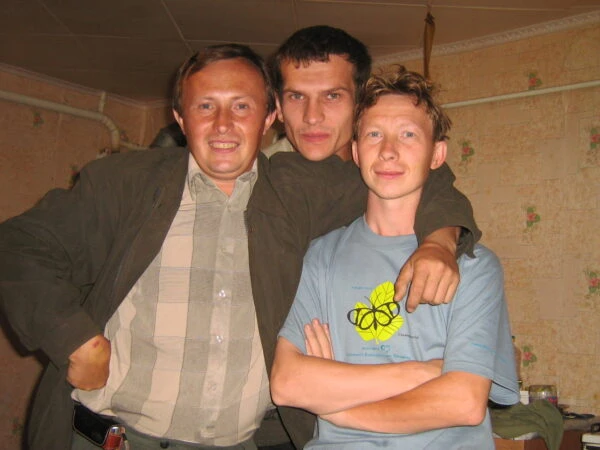
Then I came to visit my brother, to have a rest from my drinking. He knew that I had quitted attending the Jehovah’s witnesses. Religious quarreling was already excluded. While my brother was at his work, I was reading Christian books and listening to Christian music. Something began to melt in my heart, though I remained skeptical and cynical at the time. However, the more I read and listen, the more my heart was melting. I felt I had a burden inside pressing on me. Then I knelt and said, “The Lord, if You really are Who you are… I don’t know who You are like. If You are how the Baptists describe you… If you exist, forgive me. I want to be with you. I don’t know what is going to be, but, please, don’t forsake me.
Then I felt that the burden was off my chest. I really felt the Holy Spirit descent on me and experienced God’s love. I went to the church my brother was attending and converted in public. My first desire was to share Christ with everyone.
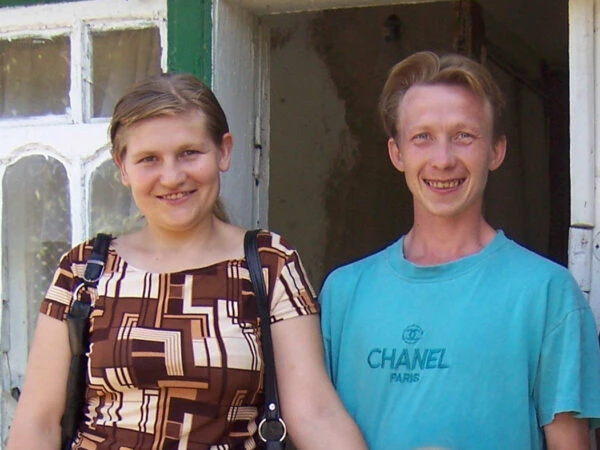
I felt like being a missionary to a remote country, but God told me to wait. In half a year a girl who later became my wife joined our church. We got married in three months after we met and moved to Odesa region. There, we completed our studies at a seminary, though the idea to become a missionary was still haunting me. At the seminary, I annoyed everyone by repeating that, if anyone needed a missionary, I was ready to become one.
For the next six years we were serving in the northern part of the Odesa region, in the village of Konopliane. Though I was ready to stay in that village, in 3-5 years God started showing me the prospects of a foreign mission. At that time, two brothers in Christ came to us from Syria in search of missionaries. That country seemed so remote to me. Later, I applied to a missionary department and waited for a call for around six months.
Later, a cohort of 11 people was admitted to be trained for missions in two countries – Tajikistan and Syria. As for me, I chose Syria.
We were studying for three years, but only five of us completed our studies. Two of these five also left. So, considering that one of the remaining three is currently serving in Ukraine, only two students out of the whole group have become foreign missionaries.
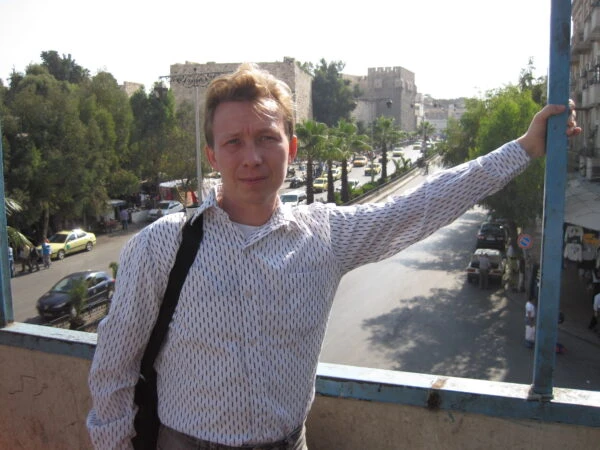
Afterwards, we were deployed to Syria, where, in 2010, the Arab Spring started. When the insurgents were approaching Damascus, the brothers bought an airplane ticket for us, and we returned to Ukraine. Initially, we thought that we would wait for a month or two and go back to Syria… However, the fighting has been underway there for 11 years.
The Committee of Foreign Mission of our Baptist Union (hereinafter referred to as the Committee) proposed us to go to Egypt, since many Russian-speaking women – from 30 to 40 thousand or one out of ten city residents – were living in Hurghada.
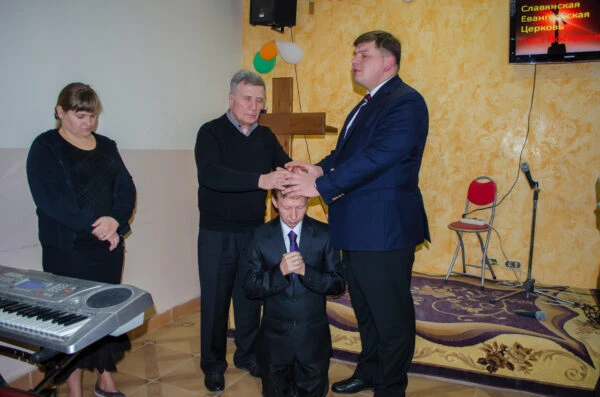
That is how we found ourselves in the country of pharaohs. I spent five years there. God enabled us to plant a Slavic church where I was ordained a pastor.
As in most Muslim countries, Christians are forbidden to preach to the Muslim. If a Muslim believer states that you presented a Bible to him or shared about Christ, and is ready to testify, you are facing a risk of up to five years in prison.
The Muslim people, however, can freely tell Christians about Islam… It is even encouraged. I heard that that had unofficially agreed that a non-Muslim person may not occupy leading positions. You may be a good teacher, but if you are a Christian, you will never be appointed to the position of a school principal. A good Christian doctor will never become a chief doctor.
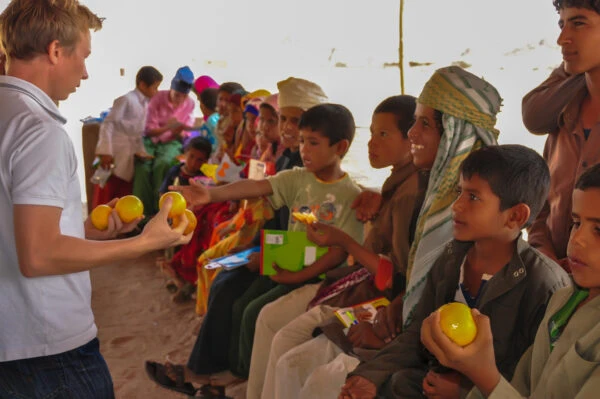
Despite all bans, we, of course, worked with the Muslims, in particular with Islamic shelters. When the first Muslims converted, local security service officers started following me.
Once, when we were crossing a border, we were detained at the airport. It was then when a chief of the local security service set a condition that I either come over to the service to report on everything that takes place at our church – who grabs a New Testament, who attends the church, who is interested in Christianity, – or get imprisoned. The choice was not easy.
However, the Ukrainian embassy interfered, having joined our side, and we found ourselves in the Motherland in a day, since we were deported from Egypt by the nearest flight.
It was a real shock as five years of my ministry, including the church, friends and belongings were left behind.
We returned to Ukraine at the end of October. It was rather cold, but we were wearing T-shirts. Thanks to God, He showed the benefits of mutual assistance. Just in one day we all with our three children were fed, clothed, sheltered in a house we could live in for an indefinite period of time.
In a month I understood that Egypt could be forgotten. Then I started praying about the continuation of our missionary ministry. There were quite many proposals, in particular Kamchatka, Belgorod, Kursk, where there were churches lacking ministers.
I was invited to be a pastor of a newly-planted church in Kyiv. Also, I got many proposals to go to Italy, France, Poland, and Germany to work with the Muslims there. I always answered that I would do what God says.
At the same time, I got a note from a brother in Russia, who was responsible for missionary work in the Far East, who was asking me if I did not think about ministry in the South-Eastern Asia. He had just come back from those regions – Vietnam, Thailand, Cambodia. I responded in the same way by saying that I would pray about it.
In three days, a sister wrote that their team had been on a trip to Cambodia experiencing a lack of ministers. “Have you not thought about Cambodia?” she asked. I replied in the same way I replied to everyone.
Another brother, an immigrant to the United States, wrote to me in three or four days, asking the same question: “Have you not thought about Cambodia?”
At that moment, I had no idea where Cambodia was!
At that time, I was getting ready with my family to go to Jordan. The legislation there is not as rigid as in Syria towards foreigners who are literally followed everywhere. It is simpler in Egypt, but it is prohibited to work with the Muslim population there. In Jordan, I visited couple times, when we invited Slavic women married to the Muslim, they came in hijabs and listened to my sermons. There is no pressure there from the Muslim.
Yes, I was planning to go to Jordan, though I did not feel like going there. After I got interested in Cambodia, started reading about this country, I got another feeling (though we, being Baptists, are not taught to follow feelings). The more I read about Cambodia, the more I watched videos, the more I understood that I wanted to go there.
When I shared my desire with the Foreign Mission Committee of our Baptist Union (hereinafter referred to as the Committee), they were slightly surprised. Where is Jordan and where is Cambodia? Where are the Arabs and where are the Khmers? Where are the Muslim and where are the Buddhists?
I went on my so-called exploration trip with two brothers from the Committee – foreign mission administrator Roman Diachuk and mobilizer Volodymyr Zapadniuk. Together with the brothers, we crossed the whole country. The more we traveled, the more I realized that it was my place.
Then, when I was flying back, a missionary from the Philippines, who had planted several churches in Cambodia, said, “Zhenia, we are waiting for you.”
That was the last stroke… Having arrived home, I told Tania that we were going to Cambodia.
– How long have you been living in Cambodia? Can you tell us a couple words about this country and what, in your opinion, is special about it?
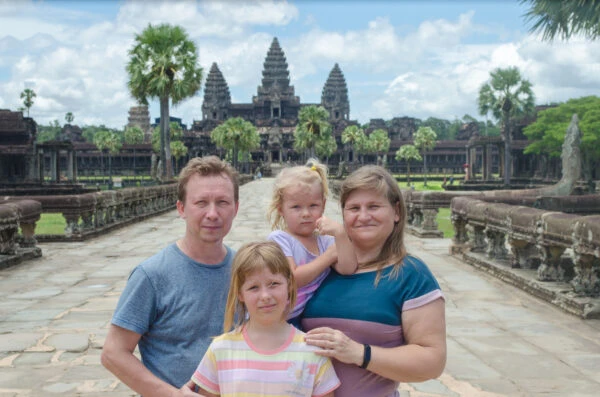
We have been living here since 2018. Let me start with pluses… Like any other oriental country, Cambodia is a country of smiles. Everybody is smiling here, by far more that the Americans do. The Cambodians smile for any reason.
There were even some curiosities… I got into an accident when a local guy crashed into my scooter and started smiling. That was a guilty smile, but smile anyway! Why are you smiling? That is a good question. But now I also smile anywhere I go.
I can’t say that the local people don’t quarrel, but, unlike the Egyptians who grab stones in any situation, I have not witnessed any fighting. The Khmer are calmer, or even more naïve.
Cambodia is a cozy country. One does not feel tension here as in Egypt. First, there is religious freedom in Cambodia. If there are any restrictions, they are rather technical and spiritual. Let us assume, you can start a church, but its premises must be at least 1 kilometer away from other religious building, for example, Buddhist or Muslim.
There is no pressure from Buddhism or Islam. There is also no pressure of thinking that you are going to be deceived any time. The Egyptians, for example, deceive one another all the time. You cannot believe anyone there. It is commonplace in their culture.
There is nothing like that in Cambodia. The local people are open enough to get easily acquainted with them, talk. There is no aggression as the Khmers are rather friendly.
As far as negative things that caught my eyes… I was very surprised when, being invited as a guest, you are not offered anything, even a cup of water, not to mention tea or staying overnight!
I don’t know what it is connected with… I would not say that Cambodia is a poor country. In Egypt, where I returned after visiting poor residential areas with a full stomach, having drunk around 20 cups of tea, the situation is just the opposite. Here one needs to be really intimate with a person to be offered something.
At the same time, when the Khmers came over to our house for a visit and my wife asked them if they would eat or drink anything, they reacted with suspicion.
Some pastors invited me to sit with them at a table only when I got well acquainted with them. In other words, if someone does not know you well or you don’t have an open and intimate relationship with him or her, he or she will not offer you neither food nor water.
The second thing that surprised me was that, being open, they tell you that they are dissatisfied with something. This is oriental mentality in action again – they don’t want to counter you directly.
For example, we went to buy a motorcycle as everyone needs a bike or motorcycle. There is no public transportation here. Buying a motorcycle, however, is different from choosing socks. In half an hour after I started analyzing different motorcycles and comparing prices, a friend of mine gave me a call and asked to be as quick as possible, because the person assisting needed to leave soon. At the same time, though the one who was assisting me in buying a motorcycle, was standing beside me, he did not tell me a word directly that he was running out of time! Even at our shelter children behave in the same way. It creates some tension because you never know what a person thinks about you or what he or she wants.
The third surprising thing has to do with roads. Their chaotic driving shocks. When a local person is not driving, he or she is smiling, open and friendly. When the same person is driving, he or she looks as if substituted by someone else. There are not notions in Cambodia such as primary and secondary roads. The one who squeezes in first, goes first. If you don’t squeeze in first, you are going to stand all day long, since no one will let you go.
– How easy is it to preach the Gospel in the country where 90% of the population are Buddhists?
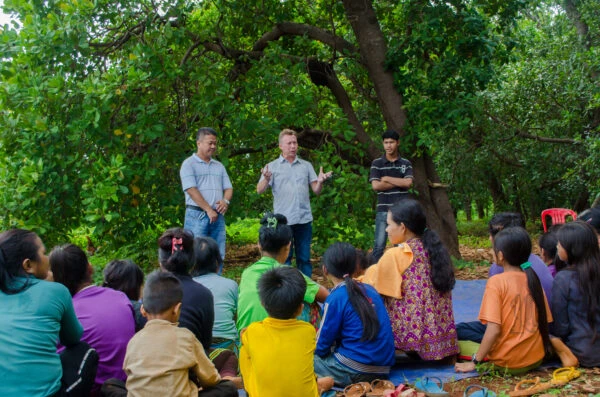
It is so easy to preach the Gospel that sometimes it seems impossible… When we were evangelizing in the countryside, 25 out of 30 raised their hands willing to pray a prayer of repentance. In some villages 50 out 50 agreed to say a prayer or repentance. Initially, I was very excited. I even shared this on Facebook. In the fourth village, it occurred to me that, taken the pace, we could convert the whole Cambodia. Am I the first missionary here to reach out to the locals with the Gospel? Something is sure to be wrong here.
When I got to know that no one out of all 50 “converts” came to a church, I was very disappointed. Then I understood why it was so.
The Khmer word for ‘God’ sounds as prekh. They have here prekh of everything – water, sun, leaf…The local king and prime-minister are also prekhs. Anyone who occupies more or less serious position is addressed as prekh. For this reason, the notion of ‘God’ is so vague that it is difficult to associate it correctly.
Other pastors confirmed that asking a person to repeat a prayer of repentance is very easy. If you need a picture, it is possible to gather a thousand people, 950 of whom will repent, and you will make a video to demonstrate how many Khmers repent. You can hold such crusades all over the country to convert the whole Cambodia at least five times.
In fact, it might take from two to three years after saying the prayer of repentance to realize that Jesus is the only God rather than one of gods. At least 2 years are needed to prepare a convert for baptism.
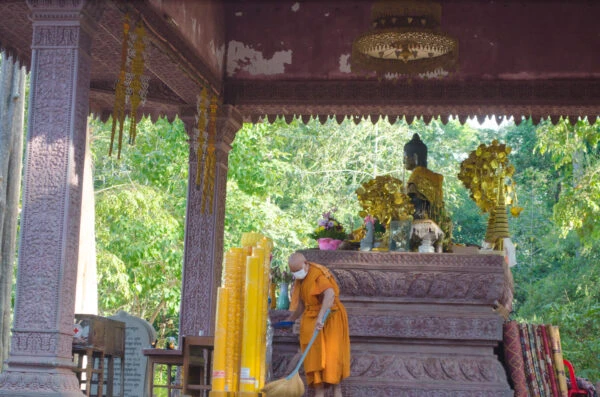
I talked to a Buddhist monk who gave me an example to answer my question about how they treat other religions.
“If you are a Christian, he says, that is great! If someone is a Muslim, super! Or a Hindu, please! Someone is a voodoo, running around a fire, it is Ok! Let us assume that this shaman is a first-grader. You, Christians, are third graders, Muslim are fifth graders, but the Hindu are seventh graders. The Buddhists, however, are university instructors.” If you are a Christian, it is not a problem. In 200-300 revivals, you will grow up to become a Buddhist. The main thing is to be a normal Christian in order not to turn into a butterfly. If you are a normal Christian, you will become a normal Hindu in the next life, then normal Krishna, then reach Buddhism.”
Of course, it is difficult to preach when a person is looking at you as a second-grader who is trying to convince him or her of something. The grassroots Buddhism is characterized with alienation, stating that Christianity is a religion of the white. They say that “Christianity is your religion, and Buddhism is our religion.”
– How to reach them out? How do you work with the Khmers?
In different ways… Whereas we have some connection points with Islam, as the Quran often quotes the Scriptures, Buddhism and Christianity have nothing in common, apart from some generally accepted moral guidelines. They are sure to have never read the Bible. We have been to some areas where people have no idea about who Jesus Christ is.
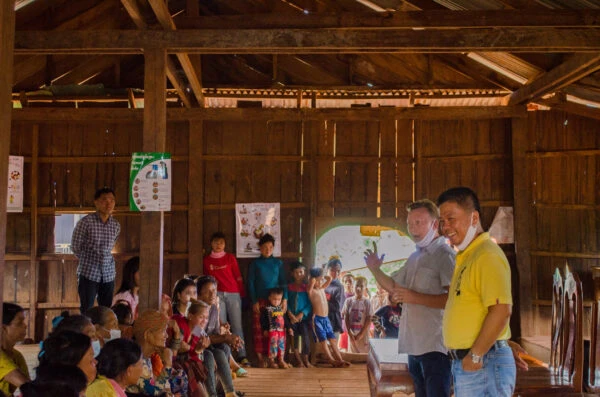
Our first evangelism surprised me. When we gathered 20 people and asked them if they had ever heard about Jesus, only one girl raised her hand.
At that moment, I thought it was impossible. How can one not hear about Jesus, if we have the Internet, television, published materials…? I asked them again. No, they had not heard of Jesus! Can you imagine that in the 21st century there are people who don’t know who Jesus is, have not heard about Him, even His name?
The further I went to some provinces, the more I got convinced that it was true – they had not heard about Christ. That is why Christianity for them is as remote as Buddhism for us. For example, do you know the real name of Buddha? We don’t know. Why? Because we don’t need it. We are not interested in Buddhism. The same is true about them. They are not interested in other religions, including Christianity. They have their own religion.
God showed me that modern Christianity had a great number of programs to share Christ with people. But when I came to Cambodia, I understood they were not working. They could work in a post-Christian society, Orthodox or Catholic culture, but not in Cambodia.
There are notions of hell and paradise in Buddhism too. They depict hell in their local temples, and this hell is so horrible that it is beyond comparison even with hell imagined by the Roman Catholics. To tell the truth, however, they think one will not get there for a long time.
When I ask: “Do you want me to show you how to avoid hell?” people, as usual, get interested. They think that a period of staying in hell depends on how one sins. The paradise in their understanding is rather specific. Staying there depends on a number of good works. You can get to paradise for a certain amount of time, but, when your good works are over, you go back to Earth.
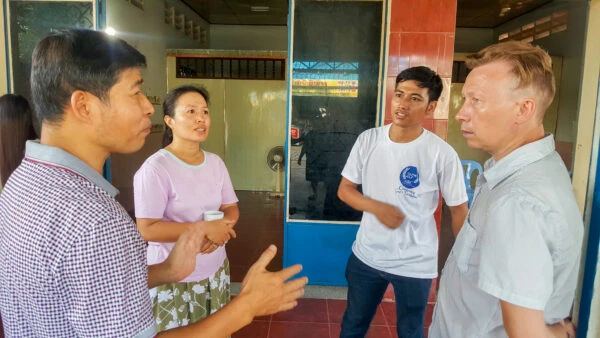
That is why God showed me that all systems which work in Ukraine don’t work here. I don’t even try to create formulas, just pray and preach pure Gospel. Every person is touched by something individual, and it is impossible to predict it. Some are touched with the prospect of being saved from hell. Some would like to get protection from evil spirits, because they all are afraid of being harmed or evil spirits spoiling their life.
In one of my posts on Facebook I shared about “a child of curse.” The parents of the girl got divorced and created other families, with their common child being abandoned because they believed that she would bring curse into their new families. They are really scared of such things, and it seems to me that they care about evil spirits more than good ones. When I say that there is One who is able to overcome any evil spirit, they show no interest in it. I don’t deny traditional approaches, but they simply don’t work in Cambodia.
– You have set up the shelter Light of Hope in response to the need of this country, which, considering the fact that children younger than 15 years old make up 40% of the population, can be called the country of orphans. Can you tell us more about this shelter?
I did not invent a bicycle. There are many shelters in Cambodia, both Christian and Buddhist, because there are so many abandoned children in the country. Such children usually don’t wander in the streets. If a family cannot provide a child with what he or she needs, they will always find a place where to take their child to.
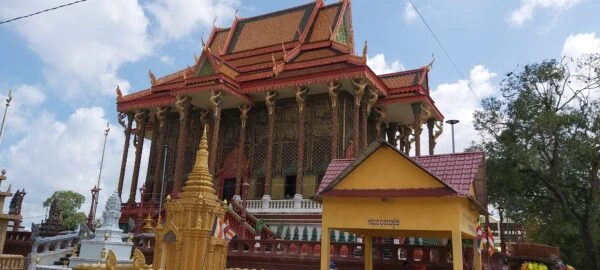
The notion of shelters dates back to the Buddhist temple with separate room in which 50-60 children lived. Most of these children are not orphans, but so-called “children of curse.” The rate of divorces is very high here. When a child is born in cohabitation or new marriage, many parents don’t want to take him or her to a new family.
Such “children of curse” are given to grandmothers, unmarried ants or, most often, to Buddhist temples.
I think that this idea has found its way from Buddhist temples to Christian churches, the number of which started growing. By the way, all churches here are rather young, because when the local dictator Pol Pot came to power in 1975, he was trying to eradicate any religion, not only Christianity, trying to build up classical communism. So, there were no Christians in the country. To gather even underground was impossible due to severe prosecutions.
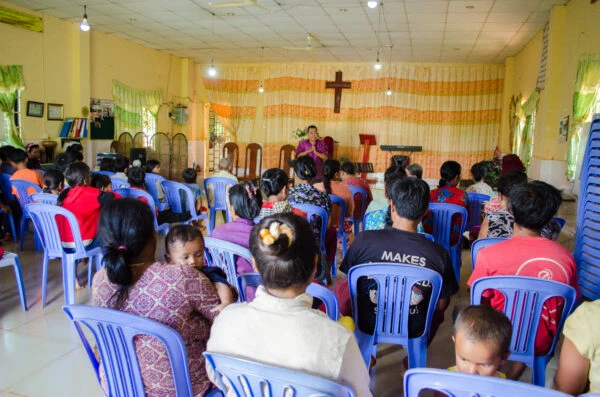
There is a map of all churches, with the oldest one dating back to 1996. The rest have been planted since 2003, similarly to young and modern Buddhist temples. All religions were restored after the regime of Pol Pot, who had been enjoying unlimited power in the country until 1979, was toppled, though the civil war was underway till 1998, when the last province was liberated from proponents of the dictator.
I know a missionary from the Philippines who came to Cambodia, if I am not mistaken, in 1996. He is one of those who started taking children to shelters. Around 200 people have come through his ministry. I asked him, “What is the percentage of children who remain Christians?”
As it turned out, on average 95% of those who escaped the Buddhist environment remain Christians. I was stunned with such results, as this is rather good evangelism. Far from all can boast that 95 people out of 100 reached out in an evangelism really accepted Christ. They become real Christians, who later become ministers, unlike the “rice” ones I mentioned before.
It was then when the idea to set up a shelter came to my mind. Later, I met another minister who also ran a shelter. Initially, it was a public shelter but the authorities transferred it to him.
I talked to another minister who confirmed high results of the ministry. I wanted to take two girls since I had girls myself. In a month, I received a call that there were seven children. I was not ready to accept seven, I wanted just two. Later, more children joined. Today, we have ten children. They live with us in a large house we rent.
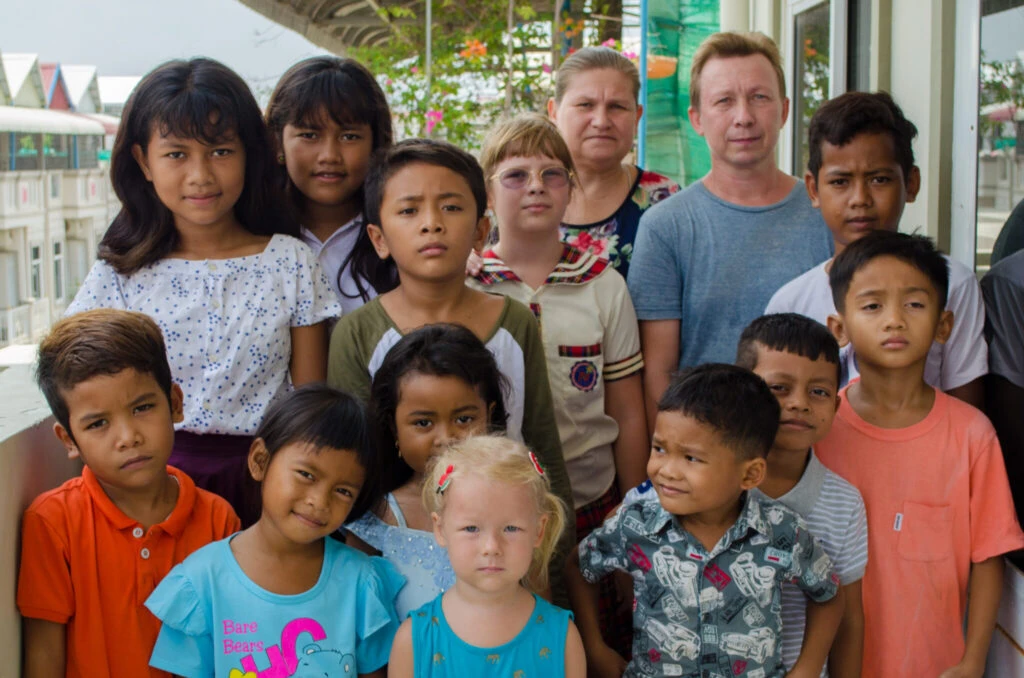
The girls (there are four of them) have their room, the boys (there are six of them) have their room. Also, we have a girl who cooks for all of us.
When they came to us, the youngest boy was 5, and the oldest child – a girl – was 14. Neither of them could read or write. They had never attended school. All of them were untidy. It took me a month to teach them some discipline.
The older children from 9 to 14 have become first graders. So far, it is only the oldest who reads syllables. The rest have not learned the alphabet yet. To tell the truth, the Khmer alphabet has 72 letters which is the biggest number of letters in the world.
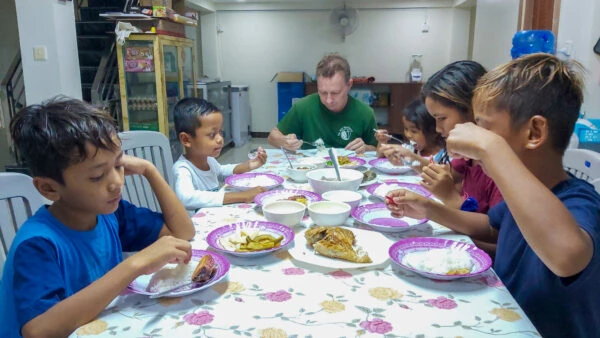
I remember praying before meals… I asked, “Who will pray today?” Whereas at that time everyone kept silent, saying that they couldn’t, today they all raise their hands. We all take turns, and when it is my turn, all children help me because my Khmer language leaves much to be desired.
On his 13th day in our shelter, our oldest son, who is 13, started calling me father.
First as a joke, but he admitted that he had a father who never was interested in him. Our son remembered his leaving the family, but never talked to him.
In a week all the children started calling me father and my wife Tania mother. Many of them had never seen their biological fathers, some of them had never even seen their biological mothers.
The most terrible punishment for them is to say that I would take him or her back home.
We had a boy who used to steal and fight at school. He even bit a teacher. So, I took him home for a week. Having neither father, nor mother, he lived with an 80-year old granny. I came in a week and asked if he would obey… When back in the shelter, he was very obedient.
Actually, there was nowhere to live… This is a separate issue – what families they came from… All dysfunctional. He is only 11, but he has tried taking drugs, sniffing glue. Here, at the shelter, everything is different. They all sing Christian songs, attend the church, and read the Bible every night.
– Yevhen, can you share about the ministry of free eye clinics in Cambodia?
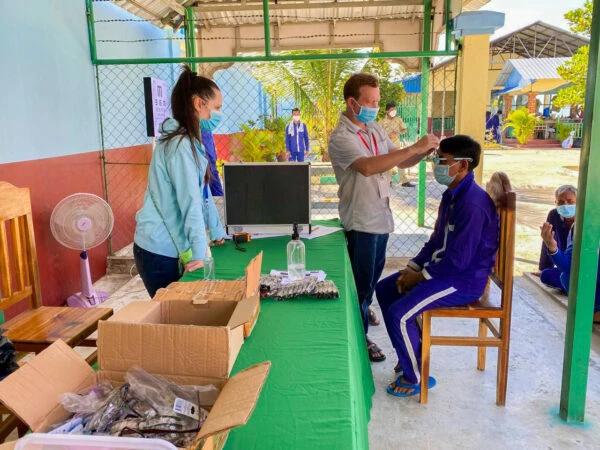
The solution was classical… Taras Sen’, the director of the Christ is the Answer Ministries, suggested using eye clinics as the evangelism tool in Cambodia. The Mission helped to buy equipment to organize and hold our outreach events.
This is, by the way, a very efficient instrument. We also distribute calendars. No patient has refused so far.
We organize eye clinics in prisons, and also through local pastors at churches both for non-believers and believers who need glasses.
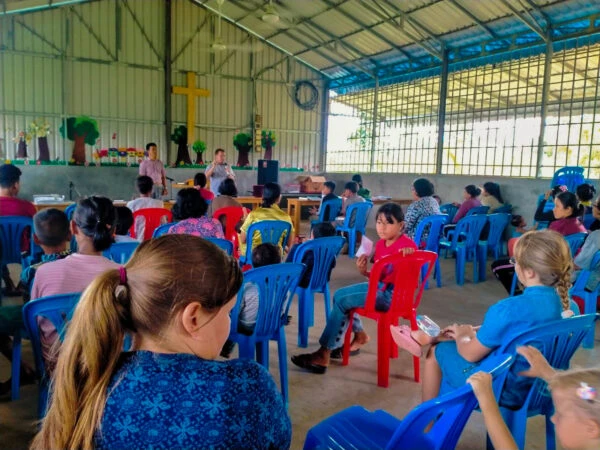
During our eye clinics, a pastor, as a rule, preaches and we distribute Christian booklets together with glasses.
Of course, I am interested in the results. For example, 2-3 people out of 30 clinic patients come to a church. This is the result we have.
Another advantage is that the status of the church is raised in the eyes of village residents as well as, accordingly, their opinion of Christians.
Eye clinics are working well… The last time when we held our event, many people came. Later, I learnt that some of the new converts started regularly attending church services.
– What do local people think about the war in Ukraine, considering that Cambodia went through the communist regime and genocide of 1975-1979?
It is quite unpleasant but almost all South-Eastern Asia is pro-Russian. When Russia launched its offensive against Ukraine, starting bombarding our cities, occupying territories, the Khmers told me that Ukraine would not last long. They even justified the war since their television is very loyal to Russia. They have a pro-Russian center in Cambodia… The Soviet Union helped them a lot, many Khmers studied in the former Soviet Union. That is what they are pro-Russian in a way.
In several months of the war in Ukraine, the Khmers surprised me. In their confidence that Ukraine had no chances, they admired its resilience and resistance, thinking though that these were Ukrainians who were increasing the number of war victims because they did not want to surrender.
In two months of the war their mood started changing even more, and not only among the ordinary people. I know some Slavic women married to generals of local security services like the Security Service of Ukraine. Their opinion of the Ukrainians swung in the direction of admiration. Today, many of them say that Putin should not have started the war, and Ukraine will win.
Those who are against say that Russia has rusty military equipment, the Ukrainians destroy them in thousands, and the Americans help them with javelins.
It does not change their pro-Russian position. They think that NATO wants to destroy Russia and, moreover, is currently doing it through the hands of the Ukrainians. This opinion is imposed on the local population by their mass media, though there are enough alternative sources of information here. Mass media is not silenced. Only those things which are contrary to their state policy may be silenced.
Once I talked to some Khmers and saw that their position was changing. One of them was supportive of the Russians, and the four of them responded that the Russians attacked Ukraine.
– What advice would you give to young missionaries?
First and foremost, I would advise every person – not only the beginner missionary – but everyone who wants to serve God to pray about what to do. Or, as I say, to find oneself in God. We know that God gives His gifts to everyone.
It is important to find oneself in how God wants to use me for Himself rather than what I want to do. These are totally different things. What I want or can do for God also works. But it is much more important and pleasant to pray: “The Lord, take me and use me as You want.”
When I came on a mission for the first time, I had my plans. Yes, we were required to make a plan. However, in some time, I had to crumple all papers with my plans and throw them away. It was God’s turn to launch the ministries which even had not occurred to me.
It is important to be open to where God will lead you. I would like to share the main idea – every Christian needs to find himself or herself in God.
The whole world is like a person on a surgery table. God is a surgeon. We are not His assistants, but we are instruments on the table. Angels are His assistants. One needs to be ready to be taken up by God and used.
Everything depends on who you are. If you are a knife, God will start using you to cut the dying world, and you will not probably even understand how He will be doing that. You may be a needle to do anesthesia. It is obvious that it is necessary to numb something. What if you are a cotton swab to absorb blood?
It is really important to realize that we are God’s instruments in his hands rather than His assistants. This image helped me a lot at the beginning of my ministry.
– Thank you for this interview.
Blessing to you in your ministry to our Lord!
The material has been prepared by the Christ is the Answer Ministries.
